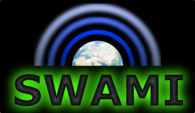SWAMI - Space Weather Atmosphere Model and Indices
Diese Seite ist zur Zeit leider nur in englischer Sprache verfügbar.
Space weather has various effects on our technology. One important effect is on atmospheric density and thus space operations. Space weather driven atmospheric density variations in particular affect low Earth orbit (LEO) satellites, which represent a several hundred million EUR per year business. These LEO satellites (including the International Space Station), which are crucial for earth observation and communication, are affected by space weather effects during all phases of their operational lifetime. Likewise, rocket launches, re-entry events and space debris are affected.
A better understanding of space weather processes and their impact on atmospheric density is thus critical for satellite operations as well as for safety issues. The ‘Space Weather Atmosphere Model and Indices’ (SWAMI) project aims to enhance this understanding by:
- Developing improved neutral atmosphere and thermosphere models.
- Making a major leap forward by combining these physics-based and empirical models.
- Exploiting new geomagnetic activity indices.
- Improving the forecast of the activity indices.
Laufzeit
01/2018 - 03/2021
Zuwendungsgeber
The EU Research and Innovation programme Horizon 2020
Projektverantwortliche
- Sandra Negrín (DEIMOS) - Primary Coordinator
- Dr. Sean Bruinsma (CNES)
- Prof. Dr. David Jackson (Met Office)
- Prof. Dr. Claudia Stolle (GFZ)
ProjektmitarbeiterInnen
- Prof. Dr. Yuri Shprits (GFZ)
- Dr. Guram Kervalishvili (GFZ)
- Dr. Jürgen Matzka (GFZ)
- Jan Rauberg (GFZ)
- Irina Zhelavskaya (GFZ)
- Dr. Ruggero Vasile (GFZ)
Projektwebseite
Kooperationen
- DEIMOS Space Sociedad Limitada Unipersonal (DEIMOS), Spain
- Centre National D'Etudes Spatiales (CNES), France
- Met Office (Met Office), UK
Publikationen
- Zhelavskaya, I. S., Vasile, R., Shprits, Y. Y., Stolle, C., Matzka, J. ( 2019), Systematic Analysis of Machine Learning and Feature Selection Techniques for Prediction of the Kp Index. Space Weather, 17, accepted manuscript, https://doi.org/10.1029/2019SW002271
- Matzka, J., Stolle, C., Kervalishvili, G., Rauberg, J., Yamazaki, Y. (2019), The Hp geomagnetic index test dataset 2003, 2004, 2005 and 2017, GFZ Data Services, http://doi.org/10.5880/GFZ.2.3.2019.002
- Liemohn, M. W., McCollough, J. P., Jordanova, V. K., Ngwira, C. M., Morley, S. K., Cid, C., Tobiska, W. K., Wintoft, P., Ganushkina, N. Y., Welling, D. T., Bingham ,S., Balikhin, M. A., Opgenoorth, H. J., Engel, M. A., Weigel, R. S., Singer, H. J., Buresova, D., Bruinsma, S., Zhelavskaya, I.S., Shprits, Y. Y., Vasile, R. ( 2018), Model evaluation guidelines for geomagnetic index predictions, Space Weather, 16, 2079– 2102, https://doi.org/10.1029/2018SW002067





